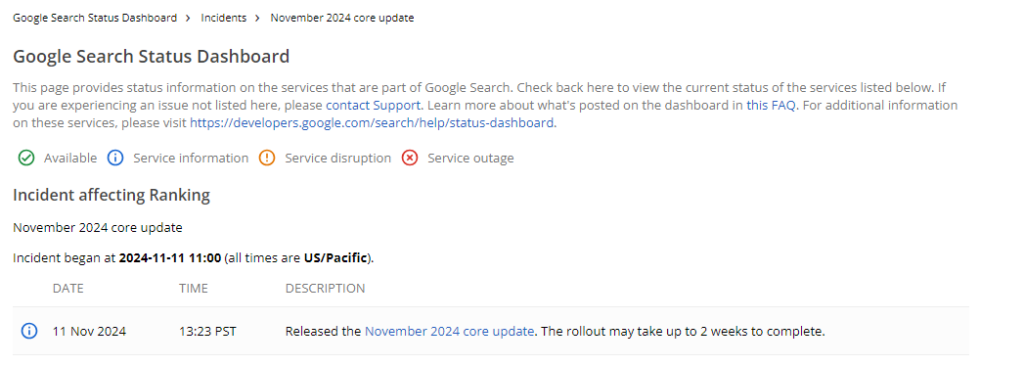An “Incident Affecting Ranking” is a term used by Google to refer to any event or issue that causes a disruption in the normal ranking behavior of websites in search results. This can involve algorithm changes, bugs, ongoing issues, or technical glitches that impact how websites perform in Google Search. The purpose of this feature is to provide transparency and inform webmasters, SEOs, and website owners about potential factors that may be affecting their website’s visibility or performance in Google Search results.

Google’s ranking systems are complex, automated, and constantly evolving to ensure that the most relevant and useful results are shown to users. As Google updates its algorithms, releases new features, or resolves technical issues, the performance of websites can fluctuate. These fluctuations might be temporary or long-term, depending on the nature of the incident.
When an incident is affecting rankings, it’s important for webmasters and SEOs to stay informed so they can adapt their strategies accordingly. Google regularly provides information through the Google Search Status Dashboard, a tool that reports when incidents occur, offering clarity on the impact of algorithm updates, bug fixes, or other technical issues.
Understanding the November 1, 2023 Bug Fix in Google Search Console

On November 1, 2023, Google confirmed that a bug affecting Discover-related traffic was fixed. The bug caused some websites to experience a temporary increase in traffic specifically coming from Google Discover. For context, Google Discover is a personalized feed of content that appears to users on mobile devices, based on their interests, search history, and browsing activity. This increase in traffic highlights the importance of leveraging advanced SEO strategies, such as programmatic SEO, which uses automated tools and data-driven processes to scale efforts and optimize for high-volume, high-impact keywords. Programmatic SEO can help marketers efficiently target relevant audiences and create content that aligns with user interests, much like the personalized content seen in Google Discover.
What Happened?
For some websites, this bug led to artificially inflated traffic numbers from Discover, which may have been misleading for webmasters and marketers trying to analyze their site’s performance. In particular, this bug caused an increase in traffic from Discover that was not based on actual search ranking improvements or any organic efforts from the websites involved. As a result, some sites saw a spike in traffic, which could have led webmasters to believe their content was performing better than it truly was.
This bug was fixed on November 1, 2023, and any fluctuations caused by the issue were expected to be resolved. However, once the bug was corrected, affected sites may have experienced a decline in traffic to more normal levels, potentially leading to confusion or concern.
Why Was This a Big Issue in Incident Affecting Ranking?
The issue was significant because Google Discover is an important traffic source for many publishers, especially those in the news, entertainment, and content industries. With traffic increases from Discover directly tied to a site’s visibility and performance, any unexpected change could cause major disruptions in a site’s overall traffic metrics.
Furthermore, the issue highlights a broader challenge for webmasters when interpreting traffic data. In many cases, fluctuations in search and traffic can be caused by factors beyond the webmaster’s control, including algorithm changes, technical bugs, or Google’s own adjustments in how search results and recommendations are served. When such issues occur, it’s important to monitor data carefully and wait for clarifications or fixes from Google before making major changes to a website’s strategy.
Ongoing Issue with Ranking on August 15, 2024

Another notable incident affecting rankings occurred on August 15, 2024, when Google confirmed an ongoing issue with its search rankings that impacted a large number of search results. While the issue was not specifically linked to any particular algorithm update, it was clear that many websites saw fluctuations in their search rankings due to this technical disruption.
Google explained that the issue led to inconsistencies in how websites were ranked across various search queries. This might have led to some websites experiencing a temporary drop in visibility or a sudden boost in rankings, without any changes to the actual content or SEO of those sites. Google typically addresses such issues quickly once identified, but until the issue is resolved, it can be frustrating for webmasters who are trying to understand why their traffic or rankings are fluctuating.
The nature of the issue was linked to an internal Google system, which likely caused incorrect indexing or ranking patterns. Google typically provides updates through its Search Status Dashboard, and once the issue was resolved, rankings were expected to return to normal.
What Are the Upcoming Updates from Google?

As of November 2024, Google’s core updates continue to be a major focus, and these updates can have a significant impact on the search rankings of websites. The November 2024 core update was officially released on November 11, 2024, with a rollout period that could extend for up to two weeks.
Core updates are major changes to Google’s ranking algorithms aimed at improving search result quality and relevance. They don’t target specific sites but focus on enhancing the overall user experience. Websites affected by these updates should assess their content quality and adhere to Google’s guidelines for relevance, authority, and helpfulness. Refining keyword research strategies is key to staying aligned with updates, helping sites target the most relevant keywords to maintain or improve rankings.
Key Factors of Google’s Core Updates:
- Content Quality: Websites that provide high-quality, helpful content that meets user intent are more likely to see improvements in rankings after a core update. Google increasingly values content that demonstrates authority and expertise in a subject.
- User Experience: Google’s ranking algorithms also assess user experience factors like page speed, mobile-friendliness, and overall usability. Websites that focus on delivering a great user experience are more likely to perform well after an update.
- Relevance and Authority: Google rewards websites that have established authority in their respective fields, particularly when their content is comprehensive and well-researched.
Google’s Approach to Algorithm Changes

Google’s ranking systems are highly dynamic and regularly updated to improve the search experience. These updates typically include adjustments to factors like relevance, the weight of different ranking signals, and how content is evaluated. It’s important for webmasters to stay informed about these updates, track their site’s performance, and adapt their strategies accordingly.
Google has also increasingly focused on AI-based algorithms (like BERT and MUM) to better understand the nuances of natural language and search intent. This means that websites that provide relevant, high-quality content and use SEO best practices aligned with user needs are more likely to thrive in the long run.
Conclusion
Incidents affecting ranking, such as bugs, ongoing issues, or core updates, can significantly disrupt the visibility of websites in Google Search results. Understanding and adapting to these changes is crucial for maintaining a website’s performance. The November 2024 core update and the November 1, 2023 bug fix underscore the dynamic nature of Google’s algorithms, as well as the challenges webmasters face in interpreting traffic data and ranking fluctuations.
To maintain visibility and stay competitive, it’s important to focus on high-quality content, SEO best practices, and a great user experience. By staying informed about Google’s updates and adapting strategies accordingly, webmasters can continue to optimize their sites for better search performance, even in the face of occasional technical incidents or algorithm changes.




